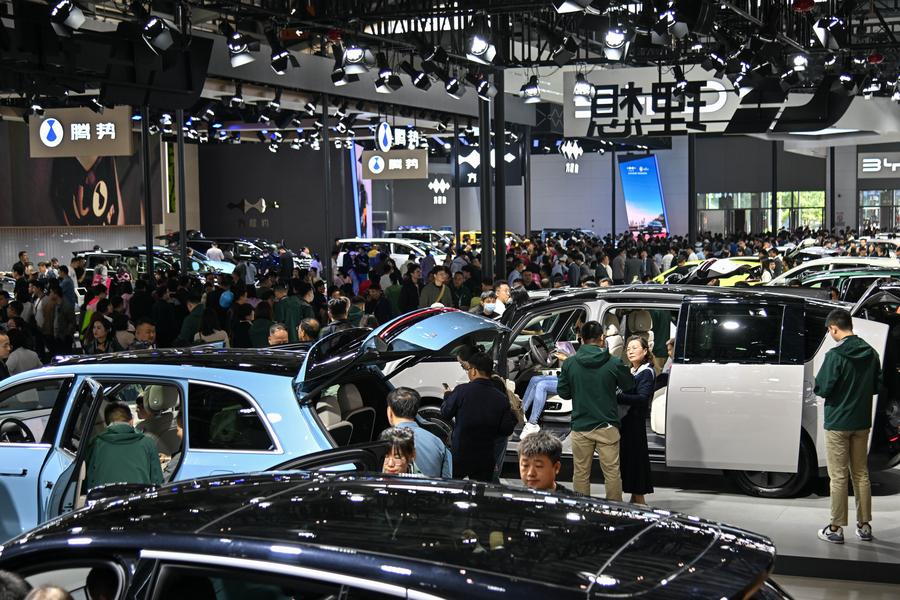
Published 14/05/2024 17:34 | Edited 05/14/2024 17:51
This Tuesday (14), the United States government announced a significant increase in import tariffs on Chinese products, totaling US$18 billion, with the declared objective of protecting North American workers and companies from unfair trade practices by from China.
The substantial increase in tariffs comes on a range of Chinese imports, including electric vehicles, solar cells, semiconductors and advanced batteries. The measure aims to protect strategic American industries from competition considered unfair, supported by Chinese subsidies.
Biden also expressed support for maintaining the tariffs on more than $300 billion in Chinese goods implemented by former President Trump, despite his previous criticism of those tariffs during his 2020 presidential campaign. He had even promised the Chinese to repeal some tariffs on Trump and backtracked.
In the liberal market universe agreed upon by Washington, Biden and Trump’s industrial protectionism can also be considered unfair competition for the rest of the world. This is how the Americans put pressure on industries around the world in their favor. Now, at his convenience, he turns the entire liberal economy to his benefit and makes it appear that China is the criminal. The explosion of US investment in these same industries is also unfair to similar industries in other countries.
These measures represent an escalation in the trade war, indicating Biden’s willingness to maintain a firm stance against China. In a speech at the White House, the president compared his approach to that of his predecessor, accusing Trump of empty promises to increase exports and boost production, without delivering.
The increased tariffs target strategic areas such as clean energy and semiconductors, in which the United States is investing significantly. Biden is betting on these investments to create middle-class jobs and win swing states that are home to parts of these industries. The new rates will affect a wide range of products, from electric vehicles and lithium batteries to semiconductors and solar panels, with increases that in some cases will quadruple the current rates from 25% to 100%.
Among the main changes announced are:
- Chinese electric vehicles: Tariffs will be quadrupled, from 25% to 100%, in 2024.
- Batteries: Tariffs on lithium-ion batteries for electric vehicles and their parts will increase from 7.5% to 25% this year, and the same will occur for lithium batteries for other uses from 2026.
- Semiconductors: Tariffs will jump from 25% to 50% from 2025.
- Solar panels: The import tax on Chinese solar cells will double, from 25% to 50%.
- Steel and aluminum: Tariffs on Chinese imports of steel and aluminum will more than triple this year, from 7.5% to 25%.
- Medical products: Duties on syringes, needles and personal protective equipment will increase significantly, reaching 50% in 2024 for some items.
In response, China’s Ministry of Commerce expressed strong dissatisfaction with the US decision, stating that it will take firm measures to defend its rights and interests.
The White House defended the measure, arguing that it complements domestic investment packages approved by the Biden administration in recent years. According to the US government, these investments have already catalyzed more than US$860 billion for industries of the future, such as electric vehicles, clean energy and semiconductors, creating new jobs and helping disadvantaged communities.
Furthermore, the US seeks to contain a possible flood of clean energy products, subsidized by China, which distort prices and harm American companies and workers. The Chinese government, in turn, classified such claims as “unfounded”.
The move marks another chapter in the growing trade tension between the world’s two largest economies, with significant implications for global trade and bilateral relations.
Repercussions
The response to Biden’s decision was mixed. Labor leaders, Democratic lawmakers and some industry groups praised the move, while the Republican National Committee criticized it, arguing that Biden is not being tough enough on China. The electoral rhetoric aims to demonstrate that Trump will do even more, by banning Chinese products in the country and taxing even more imports from around the world.
The National Retail Federation, which represents many companies that buy or sell Chinese products, called on Biden to reverse course and suspend tariffs that will hit consumers like inflation. Taxes are considered regressive for the population, as they affect the poorest. There were also those who considered that the measures affect the advancement of clean energy in the country.
China, in turn, criticized the tariffs, calling them political manipulation that would negatively affect bilateral cooperation. The country promised to take measures to defend its interests. Protectionism in the case of electric vehicles was also considered a disincentive to the energy transition.
The measures point to a difficulty for the US in facing China’s economic growth by following the liberal rules it defends for the rest of the world. Given the industrial capacity of the Chinese and the efficiency of state management of the economy, all that was left to do was break all the rules of global trade, as Europe does, and sanction the Chinese economy with super taxes and heavy protectionism that was fought for decades in international organizations. .
The tariff increases will affect about $18 billion in annual imports from China and include a quadrupling of tariffs on Chinese electric vehicles, from 25% to 100%. Biden hopes to strengthen protections for American industries, especially those related to clean energy.
Despite concerns about potential impacts on American consumers, the Biden administration justified the tariffs as a necessary response to China’s unfair trade practices, including state subsidies and intellectual property theft.
Source: vermelho.org.br

